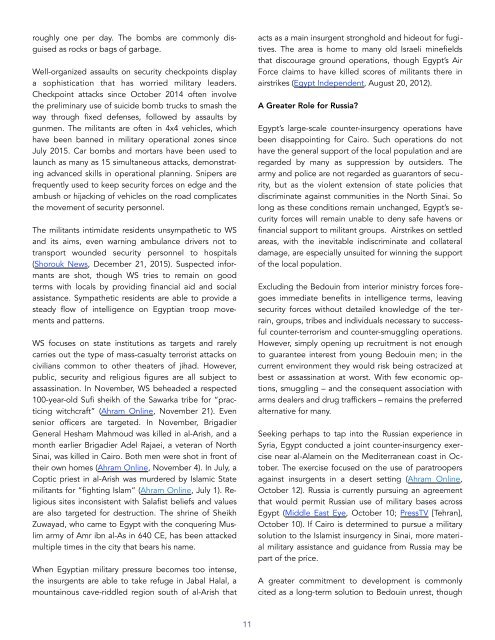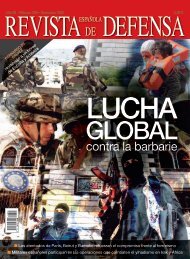You also want an ePaper? Increase the reach of your titles
YUMPU automatically turns print PDFs into web optimized ePapers that Google loves.
oughly one per day. The bombs are commonly disguised<br />
as rocks or bags of garbage.<br />
Well-organized assaults on security checkpoints display<br />
a sophistication that has worried military leaders.<br />
Checkpoint attacks since October 2014 often involve<br />
the preliminary use of suicide bomb trucks to smash the<br />
way through fixed defenses, followed by assaults by<br />
gunmen. The militants are often in 4x4 vehicles, which<br />
have been banned in military operational zones since<br />
July 2015. Car bombs and mortars have been used to<br />
launch as many as 15 simultaneous attacks, demonstrating<br />
advanced skills in operational planning. Snipers are<br />
frequently used to keep security forces on edge and the<br />
ambush or hijacking of vehicles on the road complicates<br />
the movement of security personnel.<br />
The militants intimidate residents unsympathetic to WS<br />
and its aims, even warning ambulance drivers not to<br />
transport wounded security personnel to hospitals<br />
(Shorouk News, December 21, 2015). Suspected informants<br />
are shot, though WS tries to remain on good<br />
terms with locals by providing financial aid and social<br />
assistance. Sympathetic residents are able to provide a<br />
steady flow of intelligence on Egyptian troop movements<br />
and patterns.<br />
WS focuses on state institutions as targets and rarely<br />
carries out the type of mass-casualty terrorist attacks on<br />
civilians common to other theaters of jihad. However,<br />
public, security and religious figures are all subject to<br />
assassination. In November, WS beheaded a respected<br />
100-year-old Sufi sheikh of the Sawarka tribe for “practicing<br />
witchcraft” (Ahram Online, November 21). Even<br />
senior officers are targeted. In November, Brigadier<br />
General Hesham Mahmoud was killed in al-Arish, and a<br />
month earlier Brigadier Adel Rajaei, a veteran of North<br />
Sinai, was killed in Cairo. Both men were shot in front of<br />
their own homes (Ahram Online, November 4). In July, a<br />
Coptic priest in al-Arish was murdered by <strong>Islamic</strong> State<br />
militants for “fighting Islam” (Ahram Online, July 1). Religious<br />
sites inconsistent with Salafist beliefs and values<br />
are also targeted for destruction. The shrine of Sheikh<br />
Zuwayad, who came to Egypt with the conquering Muslim<br />
army of Amr ibn al-As in 640 CE, has been attacked<br />
multiple times in the city that bears his name.<br />
When Egyptian military pressure becomes too intense,<br />
the insurgents are able to take refuge in Jabal Halal, a<br />
mountainous cave-riddled region south of al-Arish that<br />
acts as a main insurgent stronghold and hideout for fugitives.<br />
The area is home to many old Israeli minefields<br />
that discourage ground operations, though Egypt’s Air<br />
Force claims to have killed scores of militants there in<br />
airstrikes (Egypt Independent, August 20, 2012).<br />
A Greater Role for Russia?<br />
Egypt’s large-scale counter-insurgency operations have<br />
been disappointing for Cairo. Such operations do not<br />
have the general support of the local population and are<br />
regarded by many as suppression by outsiders. The<br />
army and police are not regarded as guarantors of security,<br />
but as the violent extension of state policies that<br />
discriminate against communities in the North Sinai. So<br />
long as these conditions remain unchanged, Egypt’s security<br />
forces will remain unable to deny safe havens or<br />
financial support to militant groups. Airstrikes on settled<br />
areas, with the inevitable indiscriminate and collateral<br />
damage, are especially unsuited for winning the support<br />
of the local population.<br />
Excluding the Bedouin from interior ministry forces foregoes<br />
immediate benefits in intelligence terms, leaving<br />
security forces without detailed knowledge of the terrain,<br />
groups, tribes and individuals necessary to successful<br />
counter-terrorism and counter-smuggling operations.<br />
However, simply opening up recruitment is not enough<br />
to guarantee interest from young Bedouin men; in the<br />
current environment they would risk being ostracized at<br />
best or assassination at worst. With few economic options,<br />
smuggling – and the consequent association with<br />
arms dealers and drug traffickers – remains the preferred<br />
alternative for many.<br />
Seeking perhaps to tap into the Russian experience in<br />
Syria, Egypt conducted a joint counter-insurgency exercise<br />
near al-Alamein on the Mediterranean coast in October.<br />
The exercise focused on the use of paratroopers<br />
against insurgents in a desert setting (Ahram Online,<br />
October 12). Russia is currently pursuing an agreement<br />
that would permit Russian use of military bases across<br />
Egypt (Middle East Eye, October 10; PressTV [Tehran],<br />
October 10). If Cairo is determined to pursue a military<br />
solution to the Islamist insurgency in Sinai, more material<br />
military assistance and guidance from Russia may be<br />
part of the price.<br />
A greater commitment to development is commonly<br />
cited as a long-term solution to Bedouin unrest, though<br />
11








